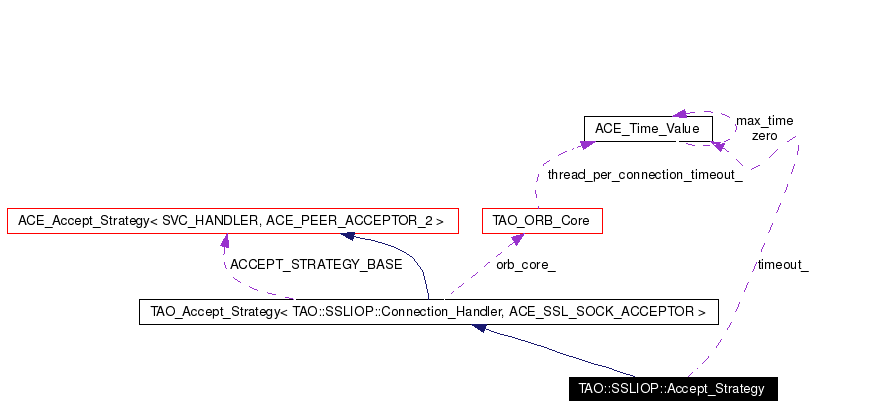
#include <SSLIOP_Accept_Strategy.h>
Inheritance diagram for TAO::SSLIOP::Accept_Strategy:


Public Member Functions | |
| Accept_Strategy (TAO_ORB_Core *orb_core, const ACE_Time_Value &timeout) | |
| Constructor. | |
| virtual int | accept_svc_handler (handler_type *svc_handler) |
Private Attributes | |
| const ACE_Time_Value | timeout_ |
| The accept() timeout. | |
This accept strategy builds on on the TAO_Accept_Strategy implementation. It sub-classes that class, and overrides the accept_svc_handler() method so that a timeout value may be passed to the underlying peer acceptor. This is necessary to defend against a simple Denial-of-Service attack.
Definition at line 65 of file SSLIOP_Accept_Strategy.h.
|
||||||||||||
|
Constructor.
|
|
|
Overridden method that forces a passive connection timeout value to be passed to the underlying acceptor. Definition at line 20 of file SSLIOP_Accept_Strategy.cpp. References ACE_TRACE, and ACE_Reactor::uses_event_associations().
00021 {
00022 ACE_TRACE ("TAO::SSLIOP::Accept_Strategy::accept_svc_handler");
00023
00024 // The following code is basically the same code found in
00025 // ACE_Accept_Strategy::accept_svc_handler(). The only difference
00026 // is that a timeout value is passed to the peer acceptor's accept()
00027 // method. A timeout is necessary to prevent malicious or
00028 // misbehaved clients from only completing the TCP handshake and not
00029 // the SSL handshake. Without the timeout, a denial-of-service
00030 // vulnerability would exist where multiple incomplete SSL passive
00031 // connections (i.e. where only the TCP handshake is completed)
00032 // could result in the server process running out of file
00033 // descriptors. That would be due to the SSL handshaking process
00034 // blocking/waiting for the handshake to complete.
00035
00036 // The timeout value will be modified. Make a copy.
00037 ACE_Time_Value timeout (this->timeout_);
00038
00039 // Try to find out if the implementation of the reactor that we are
00040 // using requires us to reset the event association for the newly
00041 // created handle. This is because the newly created handle will
00042 // inherit the properties of the listen handle, including its event
00043 // associations.
00044 const int reset_new_handle = this->reactor_->uses_event_associations ();
00045
00046 if (this->peer_acceptor_.accept (svc_handler->peer (), // stream
00047 0, // remote address
00048 &timeout, // timeout
00049 1, // restart
00050 reset_new_handle // reset new handler
00051 ) == -1)
00052 {
00053 // Close down handler to avoid memory leaks.
00054 svc_handler->close (0);
00055
00056 return -1;
00057 }
00058 else
00059 return 0;
00060 }
|
|
|
The accept() timeout. This timeout includes the overall time to complete the SSL handshake. This includes both the TCP handshake and the SSL handshake. Definition at line 87 of file SSLIOP_Accept_Strategy.h. |
 1.3.6
1.3.6